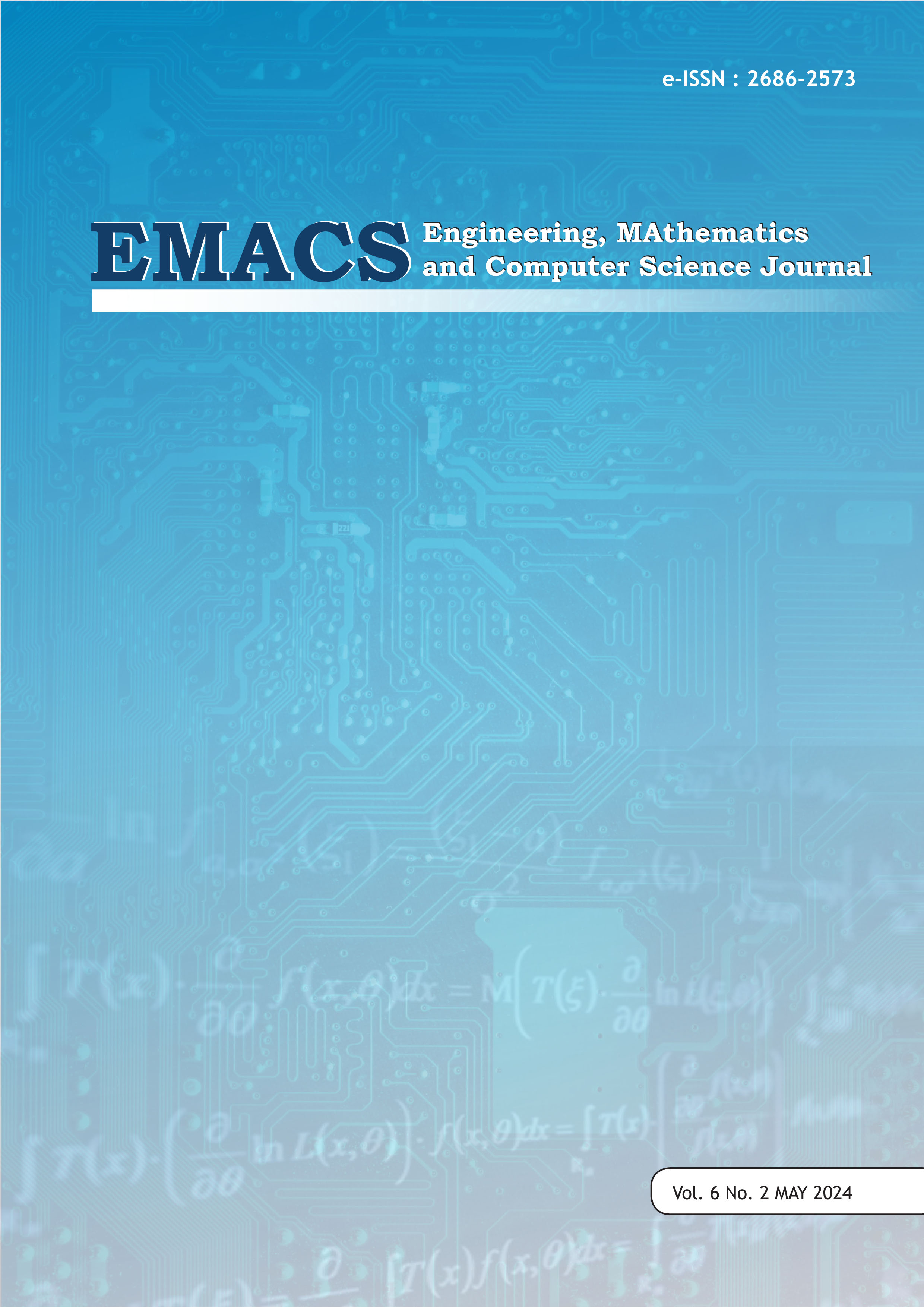Enhancing Computer Science Education Through Electronic Team-Based Learning: A Hybrid Approach to Collaborative Learning
DOI:
https://doi.org/10.21512/emacsjournal.v6i2.11713Keywords:
Electronic Team-Based Learning (e-TBL), Collaborative Learning, e-Learning, Student Engagement, Academic PerformanceAbstract
This paper explores the implementation of electronic Team-Based Learning (e-TBL) as a hybrid educational solution, combining traditional TBL methodologies with electronic platforms to enhance collaborative learning experiences. The study aims to assess the effectiveness of e-TBL in improving knowledge acquisition, teamwork skills, and overall academic performance among computer science students. The research was conducted in five phases, including preparation, experimentation, and evaluation, with a focus on developing an e-learning application integrated with Moodle. The results indicated significant improvements in student motivation, engagement, and academic achievement. The study concludes with recommendations for integrating e-TBL in various educational settings, highlighting its adaptability and potential for enhancing learning outcomes in both traditional and online environments.
References
Ahn, B. and Lee, S. (2020). Effect on self-directed learning abilities, interpersonal understanding, and satisfaction with the class among university students based in a team-project lesson. Journal of Engineering Education Transformations, 34(2), 7-15. https://doi.org/10.16920/jeet/2020/v34i2/155393
An, Y. (2021). A qualitative investigation of team-based gamified learning in an online environment. Educational Process International Journal, 10(4). https://doi.org/10.22521/edupij.2021.104.5
Andrews-Dickert, R. (2024). Improving learning experience through implementing standardized team-based learning process in undergraduate medical education. https://doi.org/10.21203/rs.3.rs-4366580/v1
Bailey, J., Read, J., Linder, B., & Neeley, L. (2020). Interdisciplinary team-based learning: an integrated opportunity recognition and evaluation model for teaching business, engineering and design students. Entrepreneurship Education and Pedagogy, 4(2), 143-168. https://doi.org/10.1177/2515127420979190
Brykman, K. and King, D. (2021). A resource model of team resilience capacity and learning. Group & Organization Management, 46(4), 737-772. https://doi.org/10.1177/10596011211018008
Burgess, A., Diggele, C., & Matar, E. (2020). Interprofessional team-based learning: building social capital. Journal of Medical Education and Curricular Development, 7, 238212052094182. https://doi.org/10.1177/2382120520941820
Drareni, N. (2019). Structuring interdisciplinary learning using tbl through pbl in cardiovascular diseases case university of algiers. Pupil International Journal of Teaching Education and Learning, 3(2), 29-46. https://doi.org/10.20319/pijtel.2019.32.2946
Fadelelmoula, T. and Abdalla, S. (2022). Team-based learning in an undergraduate health science program. International Journal of Health Sciences, 10734-10740. https://doi.org/10.53730/ijhs.v6ns3.8936
Harvey, J., Johnson, K., Roloff, K., & Edmondson, A. (2019). From orientation to behavior: the interplay between learning orientation, open-mindedness, and psychological safety in team learning. Human Relations, 72(11), 1726-1751. https://doi.org/10.1177/0018726718817812
Hashemikamangar, S. and Gholampourdehaki, M. (2021). A team-based e-learning method for clinical education in the covid-19 pandemic. Annals of Military and Health Sciences Research, 19(3). https://doi.org/10.5812/amh.115409
Kerivel, T., Bossard, C., & Kermarrec, G. (2021). Team learning process: a longitudinal study in dynamic situation. The Learning Organization, 29(1), 52-68. https://doi.org/10.1108/tlo-09-2020-0177
Lewis, D. and Estis, J. (2020). Improving mathematics content mastery and enhancing flexible problem solving through team-based inquiry learning. Teaching & Learning Inquiry the Issotl Journal, 8(2). https://doi.org/10.20343/teachlearninqu.8.2.11
Makalew, B. A., & Pardamean, B. (2017, October). Team based learning in computer science students. In 2017 3rd International Conference on Science in Information Technology (ICSITech) (pp. 296-301). IEEE.
Orsini, J., Greenhaw, L., Coleman, B., Stone, W., & Bunch, J. (2021). Experiential learning style grouping impact on student outcomes in team leadership coursework. Small Group Research, 53(3), 366-399. https://doi.org/10.1177/10464964211023558
Sakamoto, S., Dell’Acqua, M., Abbade, L., Caldeira, S., Fusco, S., & Avila, M. (2020). Team-based learning: a randomized clinical trial in undergraduate nursing. Revista Brasileira De Enfermagem, 73(2). https://doi.org/10.1590/0034-7167-2018-0621
Sinha, R. and Stothard, C. (2020). Power asymmetry, egalitarianism and team learning – part ii: empirical examination of the moderating role of environmental hardship. The Learning Organization, 28(1), 46-58. https://doi.org/10.1108/tlo-06-2020-0115
Song, E. (2023). Effects of prebriefing using online team-based learning in advanced life support education for nurses. Cin Computers Informatics Nursing, 41(11), 909-914. https://doi.org/10.1097/cin.0000000000001056
Wiese, C. and Burke, C. (2019). Understanding team learning dynamics over time. Frontiers in Psychology, 10. https://doi.org/10.3389/fpsyg.2019.01417
Wiese, C., Burke, C., Tang, Y., Hernández, C., & Howell, R. (2021). Team learning behaviors and performance: a meta-analysis of direct effects and moderators. Group & Organization Management, 47(3), 571-611. https://doi.org/10.1177/10596011211016928
Downloads
Published
How to Cite
Issue
Section
License
Copyright (c) 2024 Brilly Andro Makalew, Bens Pardamean

This work is licensed under a Creative Commons Attribution-ShareAlike 4.0 International License.
Authors who publish with this journal agree to the following terms:
- Authors retain copyright and grant the journal right of first publication with the work simultaneously licensed under a Creative Commons Attribution License - Share Alike that allows others to share the work with an acknowledgment of the work's authorship and initial publication in this journal.
- Authors are able to enter into separate, additional contractual arrangements for the non-exclusive distribution of the journal's published version of the work (e.g., post it to an institutional repository or publish it in a book), with an acknowledgment of its initial publication in this journal.
- Authors are permitted and encouraged to post their work online (e.g., in institutional repositories or on their website) prior to and during the submission process, as it can lead to productive exchanges, as well as earlier and greater citation of published work.
USER RIGHTS
All articles published Open Access will be immediately and permanently free for everyone to read and download. We are continuously working with our author communities to select the best choice of license options, currently being defined for this journal as follows: Creative Commons Attribution-Share Alike (CC BY-SA)





